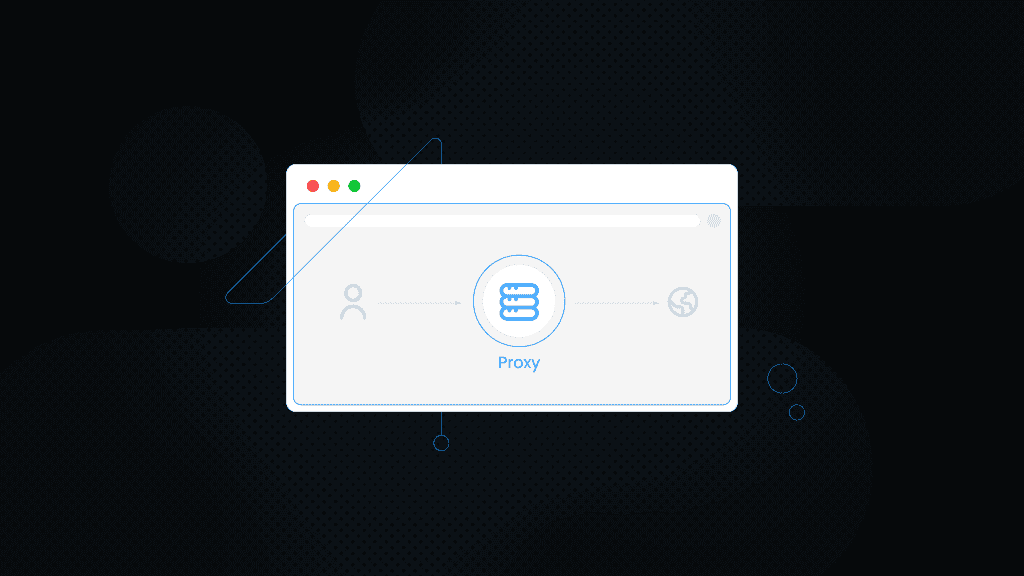What Is a Proxy Connection on a Browser? Everything You Need to Know
Did you know that every time you browse the internet, your IP address is exposed? Your IP reveals your location, device information, and even your online activities. But what if there was a way to protect your privacy and keep your online activities anonymous?
Enter the world of proxies via browsers. Determining the meaning of proxies on a browser can help you understand how these tools shield your identity and secure your online presence.
- The basics of a proxy connection on a browser.
- Different types of proxies on browsers and their advantages and disadvantages.
- How to set up a proxy on a browser.
Understanding the definition and uses of proxies on browsers
A proxy connection on a browser routes your internet traffic through a proxy server. This intermediary server masks your IP address, providing you with a different one and hiding your true identity and location.
Proxies on browsers are used to:
- Enhance online privacy.
- Bypass geo-restrictions.
- Improve internet speed by caching frequently accessed content.
- Add additional security features such as encryption.
When you enter a website address into a browser that’s connected via a proxy, your request first goes to the proxy server. The server retrieves the requested content on your behalf and sends it back to you, replacing your IP address with its own in the process. This way, your true identity remains hidden.
Enhancing anonymity with proxies on browsers
By masking your IP, proxies make it nearly impossible for websites, advertisers, or even hackers to trace your online activities back to you. This anonymity provides you with a greater sense of privacy and security while browsing the internet.
Moreover, some proxies offer additional features such as encryption, which further secures your data as it travels between your device and the proxy server. It helps protect your sensitive information from being intercepted by cybercriminals or other prying eyes, ensuring a more secure online experience.
Protecting personal information
Proxies on browsers also help protect your personal information from falling into the wrong hands. With your IP address hidden, malicious actors cannot track your online behavior or target you with personalized ads. This is particularly important when accessing public Wi-Fi networks, where cybercriminals often lurk.
Different types of proxies on browsers
Not all proxy browsers are created equal. Different types exist, each with its own set of advantages and disadvantages. Let's explore the various types of proxy browsers:
Web proxies
Web proxies are the most common type of proxies. They allow you to access websites through a web-based interface. By simply entering the website address into the web proxy, you can browse the internet anonymously without installing any additional software.
Transparent proxies
Transparent proxies are often employed by organizations to monitor or filter internet traffic. While they do provide some level of anonymity, their main purpose isn’t to hide the user's identity but rather to control and manage internet access within a network.
Anonymous proxies
As the name suggests, anonymous proxies offer a higher level of anonymity compared to web proxies or transparent proxies. They replace your IP address with a different one, making it difficult for websites to track your activities. However, keep in mind that these proxies aren’t entirely foolproof and may still leave some digital footprints behind.
High anonymity proxies
If you're looking for the utmost privacy and security, high anonymity proxies are your best bet. These proxies not only change your IP address but also remove any identifiers that could potentially reveal your true identity. They provide a high level of anonymity and are often used by individuals who require maximum privacy online.
Advantages and disadvantages of using a proxy on a browser
Like any technology, proxies on browsers come with their own set of pros and cons. Let's explore the advantages and potential drawbacks of using a proxy on a browser.
Benefits of proxies
- Privacy protection. Proxies offer a layer of privacy protection by masking your IP address and encrypting your internet traffic. This means that your online activities are less likely to be tracked or monitored by third parties, providing you with a sense of security and anonymity.
- Access to blocked content. Some proxies allow you to bypass internet censorship and access blocked content, such as websites or streaming services that are restricted in your region. Whether you want to watch your favorite TV shows that are only available in certain countries or access educational resources that are blocked by your local network, a proxy browser can be a valuable tool.
- Faster browsing. In some cases, using proxies on a browser can improve your browsing speed by caching web pages and optimizing data transfer. This means that frequently visited websites can load faster, enhancing your overall browsing experience. Additionally, proxy servers can compress data, reducing the amount of bandwidth required for each request and resulting in quicker page loading times.
Potential drawbacks
- Security risks. While proxies can enhance your privacy, they can also expose you to security risks if used on untrusted or malicious websites. It's crucial to choose reputable proxy providers and exercise caution when browsing the internet. By selecting a reliable proxy service and being mindful of the websites you visit, you can mitigate the potential risks associated with using a proxy browser.
- Connection speed. Depending on the proxy server's location and capacity, using proxies may result in slower connection speeds compared to a direct connection. This is because your internet traffic has to go through an additional server before reaching its destination. However, with advancements in technology and the availability of high-speed proxy servers, the impact on connection speed is often minimal and may not be noticeable for regular web browsing.
- Compatibility issues. Some websites or online services may not work properly when accessed through a proxy. Certain functionalities, such as location-based services or real-time updates, can be limited or disabled. This is because the proxy server can alter or mask certain information, which may affect the functionality of websites that rely on accurate data. However, most popular websites and services are designed to work with proxies, and compatibility issues are becoming less common.
Considering the advantages and disadvantages of using proxies, it's important to weigh the potential benefits against the drawbacks and determine if it aligns with your specific needs and requirements.
Setting up a proxy browser
Ready to start browsing the internet privately and securely? Setting up a proxy in a browser is easier than you might think. Follow these step-by-step instructions:
- Choose a reputable proxy browser provider that aligns with your privacy and security needs.
- Download and install the proxy browser software on your device.
- Open the proxy browser and navigate to the settings or preferences menu.
- Locate the proxy settings and enter the necessary details provided by your proxy provider. This usually includes either the host domain or the IP address and port number of the proxy server.
- Save the settings and restart the proxy browser if necessary.
You're now ready to browse the internet anonymously through the proxy browser. Enjoy enhanced privacy and peace of mind!
Tips for safe and effective use
- Choose a trustworthy proxy provider. Research and select a reputable proxy provider that prioritizes user privacy and implements high-security standards.
- Keep your proxies on a browser updated. Regularly update your proxies and browser software to ensure you have the latest security patches and features.
- Use encryption. Whenever possible, opt for proxy connection on a browser that provides encryption to safeguard your data from interception.
- Be wary of phishing attacks. Proxy connection on a browser may protect your privacy, but they can’t fully protect you from phishing attacks. Be cautious when sharing personal information or accessing sensitive websites through a proxy browser.
Safeguard your privacy with proxies on a browser
Proxy connection on a browser is an essential tool for protecting your online privacy and enhancing internet security. By routing your traffic through a proxy server, it masks your IP address, encrypts your data, and allows you to access blocked content.
Setting up a proxy in a browser is simple, and with the right precautions, you can browse the web anonymously and securely. Explore the benefits of proxies on browsers and take control of your online privacy today.
About the author

Martin Ganchev
VP Enterprise Partnerships
Martin, aka the driving force behind our business expansion, is extremely passionate about exploring fresh opportunities, fostering lasting relationships in the proxy market, and, of course, sharing his insights with you.
All information on Smartproxy Blog is provided on an as is basis and for informational purposes only. We make no representation and disclaim all liability with respect to your use of any information contained on Smartproxy Blog or any third-party websites that may belinked therein.



